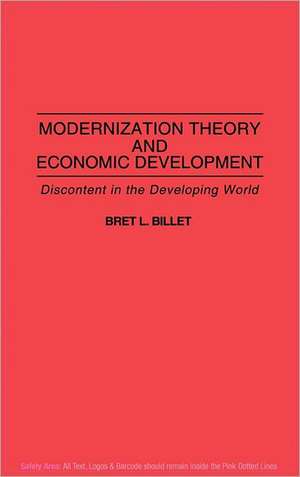Modernization Theory and Economic Development: Discontent in the Developing World
Autor Bret L. Billeten Limba Engleză Hardback – 13 sep 1993 – vârsta până la 17 ani
Preț: 344.90 lei
Preț vechi: 555.84 lei
-38% Nou
Puncte Express: 517
Preț estimativ în valută:
65.99€ • 68.91$ • 54.50£
65.99€ • 68.91$ • 54.50£
Carte tipărită la comandă
Livrare economică 15-29 aprilie
Preluare comenzi: 021 569.72.76
Specificații
ISBN-13: 9780275944469
ISBN-10: 0275944468
Pagini: 160
Dimensiuni: 156 x 235 x 11 mm
Greutate: 0.4 kg
Ediția:New.
Editura: Bloomsbury Publishing
Colecția Praeger
Locul publicării:New York, United States
ISBN-10: 0275944468
Pagini: 160
Dimensiuni: 156 x 235 x 11 mm
Greutate: 0.4 kg
Ediția:New.
Editura: Bloomsbury Publishing
Colecția Praeger
Locul publicării:New York, United States
Notă biografică
BRET L. BILLET is Assistant Professor of Political Science at Wartburg College in Iowa. Previously, he taught at the University of Cincinnati and Miami University. He is the author of Investment Behavior of Multinational Corportions in Developing Areas (1990).
Cuprins
TablesIntroductionExternal Capital Sources and Economic Growth and Development in Less Developed CountriesOfficial Development AssistanceForeign Debt, Government Involvement in the Economy, and InflationMilitary Aid, Economic Aid, and Political InstabilityConclusions and ImplicationsAppendix 1Appendix 2ReferencesIndex











